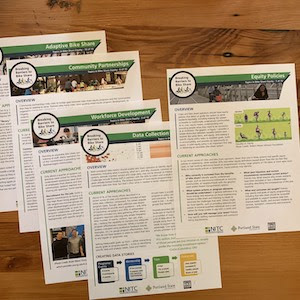Economics and Policy
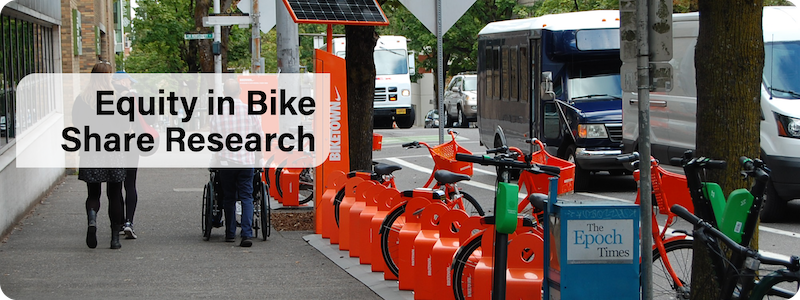
TREC research on economics and policy explores the financial, regulatory, and social impacts of transportation systems. We examine the costs and benefits of infrastructure investments, pricing strategies, and funding mechanisms, alongside policies that promote sustainable and efficient transit. This research often informs decision-making on issues like congestion, environmental impact, and accessibility. By analyzing trends and outcomes, we support the development of equitable, cost-effective, and forward-looking transportation solutions.
Learn more about some of our most impactful projects on economics and policy below.
Implementing Equity Programs in Bike Share
Have you used this research in your work? We'd love to hear from you on what content was helpful, and what you wish we had done better. We'll take your feedback and use it to improve our future bike share research and products. Let us know at asktrec@pdx.edu.
Download the full set or individual chapters:
National Scan of Bike Share Equity Programs (2019)
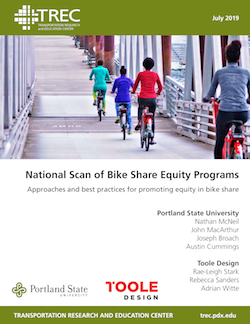
Connecting with cities and bike share operators from across the United States, we conducted a nationwide scan on what programs and initiatives were running to address equity in bike share. Our report “National Scan of Bike Share Equity Programs” documents responses from over 70 bike share systems. This resource will help cities and operators navigate the range of actions that have been implemented to make bike share systems more equitable, examine successful strategies employed across the U.S., and understand how those successes (and challenges) are being measured and articulated. In doing so, we hope the report helps bike share systems learn from the experiences of others, innovate, and more quickly move toward greater equity.
Dowload the 130+ page final report "National Scan of Bike Share Equity Programs" (PDF) and watch the webinar recording of National Scan of Bike Share Equity Programs: Best Practices and Lessons Learned
Breaking Barriers to Bike Share: Summary (2017)
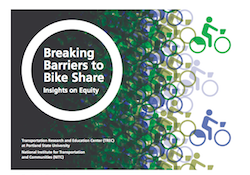
From 2015 to 2017, PSU examined bike share systems in Philadelphia, Chicago, and Brooklyn, New York, to understand what current barriers and potential motivators exist to getting lower-income residents and people of color using bike share. This research focused on underserved communities that already had bike share stations and equity programs in place, and surveyed bike share operators, current users, and potential users. For the key findings, check out:
- The Breaking Barriers to Bike Share full project page
- The 20-page summary report or
- The ITE Journal article
Breaking Barriers to Bike Share: Part I - Resident Survey
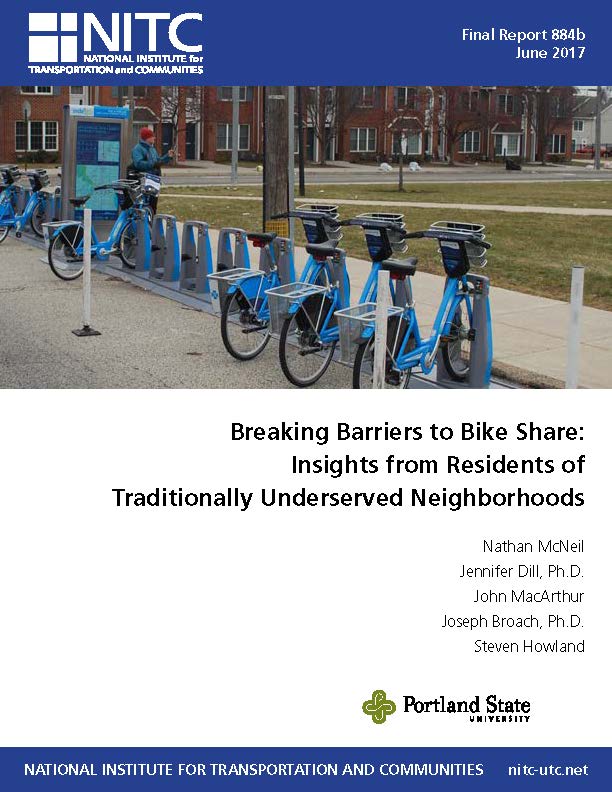 We surveyed residents living in areas targeted by BBSP efforts in three focus cities (Philadelphia, Chicago, and Brooklyn, New York) to understand how people living in low-income neighborhoods and communities of color view bicycling and bike share. We received 1,885 total responses (10.5% response rate). Four demographic categories formed the basis of our equity-focused analysis: Lower-income people of color, higher-income people of color, lower-income white, and higher-income white, with the last category representing the more typical current bike share users in U.S. cities. We also considered gender, age, and geographic differences in our analysis. The “Breaking Barriers to Bike Share: Insights from Residents of Traditionally Underserved Neighborhoods” (PDF) report provides insight into the barriers and potential motivators for people who are not bike share users in cities with bike share systems.
We surveyed residents living in areas targeted by BBSP efforts in three focus cities (Philadelphia, Chicago, and Brooklyn, New York) to understand how people living in low-income neighborhoods and communities of color view bicycling and bike share. We received 1,885 total responses (10.5% response rate). Four demographic categories formed the basis of our equity-focused analysis: Lower-income people of color, higher-income people of color, lower-income white, and higher-income white, with the last category representing the more typical current bike share users in U.S. cities. We also considered gender, age, and geographic differences in our analysis. The “Breaking Barriers to Bike Share: Insights from Residents of Traditionally Underserved Neighborhoods” (PDF) report provides insight into the barriers and potential motivators for people who are not bike share users in cities with bike share systems.
Breaking Barriers to Bike Share: Part II - User Survey
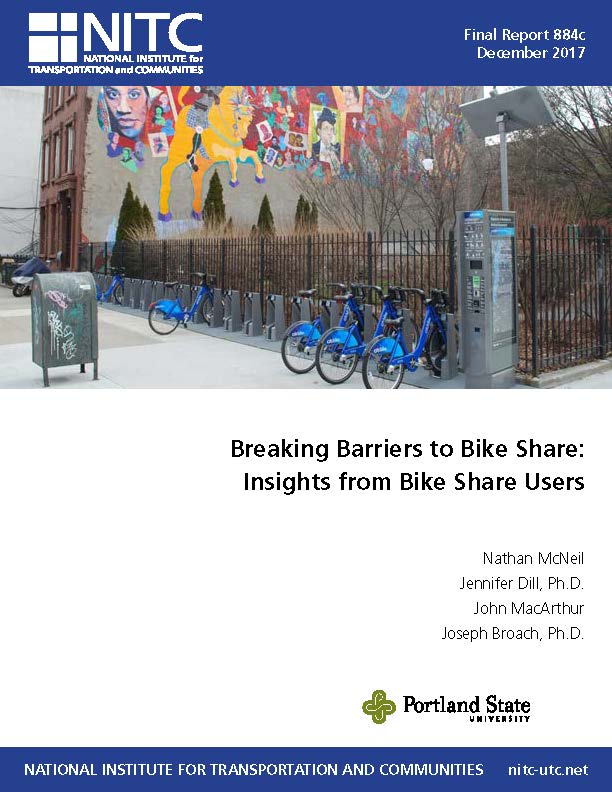 Bike share members and other people who had received information or discounts through BBSP efforts were surveyed to better understand how low-income people and people of color are using bike share, why they chose to use it, and what benefits it provides. Working with the bike share operators in Philadelphia, Chicago and Brooklyn, surveys were emailed to current or past bike share members. Members who received targeted outreach (such as joining an organized ride or taking a class) or certain equity focused discounts were also invited to take the survey. The “Breaking Barriers to Bike Share: Insights from Bike Share Users” (PDF) report examines how the bike share users targeted by equity programs are using the system, including how frequently, for what purposes, and what value it brings them.
Bike share members and other people who had received information or discounts through BBSP efforts were surveyed to better understand how low-income people and people of color are using bike share, why they chose to use it, and what benefits it provides. Working with the bike share operators in Philadelphia, Chicago and Brooklyn, surveys were emailed to current or past bike share members. Members who received targeted outreach (such as joining an organized ride or taking a class) or certain equity focused discounts were also invited to take the survey. The “Breaking Barriers to Bike Share: Insights from Bike Share Users” (PDF) report examines how the bike share users targeted by equity programs are using the system, including how frequently, for what purposes, and what value it brings them.
Breaking Barriers to Bike Share: Part III - Operator Survey
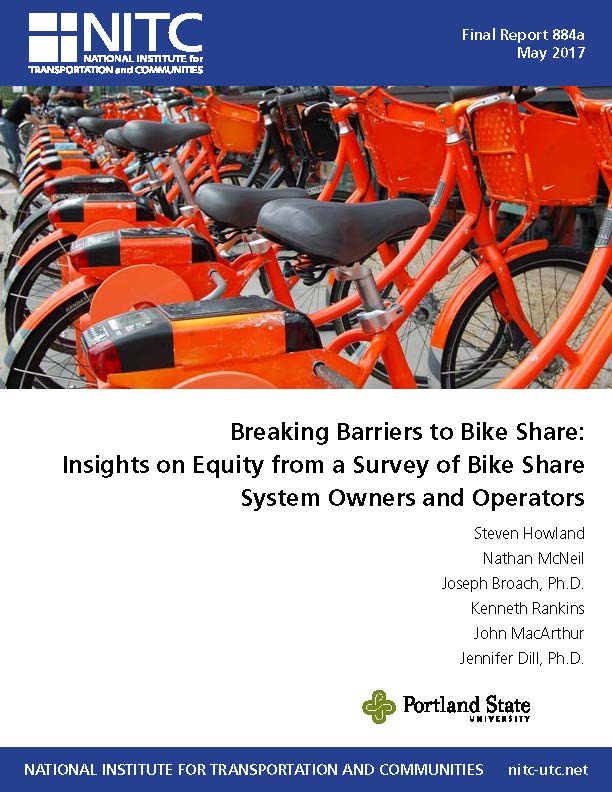 We surveyed bike share system owners and operators to understand current approaches in serving low-income and minority populations. We asked about equity policies and metrics, the degree to which equity considerations affected system practices, what operators saw as key existing barriers for target populations, and organizational challenges to addressing those barriers. The research team invited representatives from 75 active and planned bike share systems (with at least 40 bikes) to take the survey, and received responses from 56 systems. Findings from this survey are documented in the report “Breaking Barriers to Bike Share: Insights on Equity from a Survey of Bike Share System Owners and Operators.” (PDF)
We surveyed bike share system owners and operators to understand current approaches in serving low-income and minority populations. We asked about equity policies and metrics, the degree to which equity considerations affected system practices, what operators saw as key existing barriers for target populations, and organizational challenges to addressing those barriers. The research team invited representatives from 75 active and planned bike share systems (with at least 40 bikes) to take the survey, and received responses from 56 systems. Findings from this survey are documented in the report “Breaking Barriers to Bike Share: Insights on Equity from a Survey of Bike Share System Owners and Operators.” (PDF)
The People Behind the Research
Portland State University researchers working on these projects:
- Joe Broach, Research Associate, Transportation Research and Education Center (TREC); Senior Researcher and Modeler, Metro
- Jennifer Dill, and Director of the Transportation Research and Education Center (TREC) and Professor, Urban Studies and Planning, Portland State University
- Sirisha Kothuri, Senior Research Associate, Civil and Environmental Engineering, Portland State University
- Chris Monsere, Professor and Chair of Civil and Environmental Engineering, Portland State University
- Nathan McNeil, Research Associate, Urban Studies and Planning, Portland State University
- John MacArthur, Sustainable Transportation Program Manager, Transportation Research and Education Center (TREC) at Portland State University
PSU students that have contributed to these projects:
- Austin Cummings
- Steven Howland
- Jiahui Ma
- Kenneth Rankins
Additional gratitude to those who designed the Breaking Barriers to Bike Share Briefs: Cait McCusker and Jared Islas (2019 TURF Fellow).
Online Education
We have presented a variety of webinars and online seminars focused on this topic, and are always adding more. See our YouTube playlist of our online education in bike share and bike share equity.

